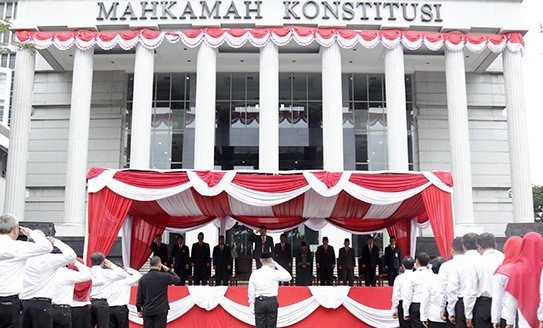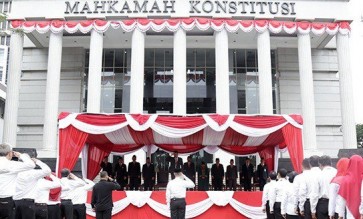Popular Reads
Top Results
Can't find what you're looking for?
View all search resultsPopular Reads
Top Results
Can't find what you're looking for?
View all search resultsEDITORIAL: Democracy in action
On Wednesday, the MK stripped the central government of its authority to annul problematic bylaws passed by local governments. The MK gave the authority to revoke a bylaw to the Supreme Court instead.
Change text size
Gift Premium Articles
to Anyone
T
he primary lesson we learned from living under the New Order regime is that a concentration of power in the executive branch of government can lead to systemic abuse. Without an effective system of checks and balances from the legislative and judicial branches of government, then president Soeharto was able to accumulate great power and use it to effectively run the country without any accountability.
The democratic system that was put in place following the demise of the New Order regime was designed not only to distribute power horizontally among the three branches of government, but also vertically between the central and local governments through the decentralization program. The horizontal distribution of power goes as far as to divide judicial power between the Supreme Court and the Constitutional Court (MK), with the latter being given the role to basically hit the brakes if the three branches of government go too far in the opposite direction.
What the MK decided last week perfectly captured how such a democratic arrangement works. On Wednesday, the MK stripped the central government of its authority to annul problematic bylaws passed by local governments. The MK gave the authority to revoke a bylaw to the Supreme Court instead.
This was a monumental decision, as in one fell swoop the court not only moved to protect regional autonomy — by not allowing the Home Ministry to have the authority to meddle in the affairs of local governments — but it also took away some of the authority of the executive branch and gave it to the judiciary, in this case the Supreme Court.
We may not like this decision, simply for the reason that the Supreme Court is mired in corrupt practices. This is an institution where even a court clerk could delay the execution of a drug convict’s sentence in exchange for a bribe.
And now it is likely that local governments will only need to pay a bribe if they want to defend bylaws being challenged at the Supreme Court. It is little wonder that the first to denounce the MK’s decision were members of the business community, who will now not only have to deal with so many problematic bylaws at the local level but also with corruption at the Supreme Court when they want to challenge them. The Indonesian Employers Association (Apindo) has said the MK ruling will cause a decline in the country’s investment reputation.
Responding to the concerns, President Joko “Jokowi” Widodo praised the MK’s decision, but rightly vowed to carry on with his deregulation drive. A balance between democracy, decentralization and growth should remain intact indeed.


















